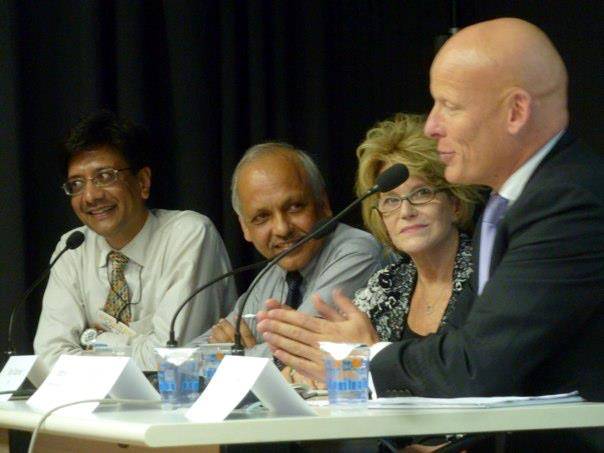|
The Future We Want ‘ We are now in sight of a historic agreement’, Secretary General Ban Ki Moon said in his address at the opening session of Rio+20. ‘Let us not waste this opportunity. The world is watching to see if words will translate into action, as we know they must.’About 40,000 people including parliamentarians, mayors, UN officials, chief executive officers and civil society leaders attended the United Nations Conference on Sustainable Development (UNCSD), also known as Rio 2012, Rio+20, or ‘Earth Summit 2012’, from 20-22 June 2012. The conference was organised by the United Nations Department of Economic and Social Affairs (UNDESA) and included participation from 192 governments, private sector companies, NGOs and other groups. It was intended to be a high-level conference, including heads of state and government or other representatives and meant to result in a focused political document designed to shape global environmental policy. Rio+20 was the third international conference on sustainable development aimed at reconciling the economic and environmental goals of the global community. Hosted by Brazil in Rio de Janeiro, Rio+20 was a 20-year follow up to the 1992 Earth Summit / United Nations Conference on Environment and Development, held in the same city, during which the countries adopted Agenda 21, a blueprint to rethink economic growth, advance social equity and ensure environmental protection, as also the tenth anniversary of Earth Summit 2002, the 2002 World Summit on Sustainable Development (WSSD) in Johannesburg. The conference was to focus on
two themes: a green economy in the context of sustainable development
and poverty eradication, and an institutional framework for sustainable
development. A series of global, regional and national meetings were
held to prepare for the conference. The Development Alternatives (DA) Group was present as one of the key contributors to the Rio+20 processes and side events, reflecting upon the work being done by the organisation at grassroots level and instigating dialogues on ‘intention to action’ in the global discourse. DA was represented by Shrashtant Patara, Senior Vice-President, and Vijay Chaturvedi, Senior Programme Manager. ‘Fair ideas - Sharing solutions for a sustainable planet’ was an IIED event during Rio+20 where the DA Group was one among the core session leads to pilot debate and discussion on ‘Social Enterprise for Green Economy and Business Models for Sustainability’. The event brought together nearly 1,000 practitioners, policy makers, activists, business representatives, researchers and community actors to share their perspectives on the key contexts in which significant change is possible, and on what it will take to achieve the same. Over the two days, the event saw more than 40 organisations address issues where DA had business models and sustainable development goals in its spotlight. DA was the panel lead on 20 June 2012 at a partnership forum organised by SEED Initiative and UNDESA (United Nations Department of Economic and Social Affairs). Highly dynamic and interactive sessions supported the idea of ‘Delivering Sustainable Development at the Entrepreneurial and Grassroots level: Challenges, lessons learned and opportunities’, to highlight the significant contributions of partnerships to the implementation of sustainable development. The session examined the role and elements of a new mechanism for budding entrepreneurs and grassroots partnerships to provide better coordinated support at the global, regional and national levels. The primary result of the Rio+20 Conference was a 49-page non-binding document named ‘The Future We Want’. In it, the heads of state of the 192 governments renewed their political commitment to sustainable development. The document largely reaffirms previous action plans like Agenda 21. It also supports the development of Sustainable Development Goals (SDGs), a set of measurable targets aimed at promoting sustainable development globally. It is thought that the SDGs will pick up where the Millennium Development Goals leave off and address criticism that the original goals fail to address the role of the in development. Funding to the tune of $ 513 billion has been committed by governments, the private sector, civil society and other groups to achieve a sustainable future for the world. Over 50 million people from all over the world were a part of the Rio+20 through social media platforms - voicing their comments, opinions and ideas - making the platforms a key component in establishing a global conversation on sustainability issues both in the lead-up to and during the Conference. Beyond the diplomatic niceties of the Rio+20 negotiations, there was one thing on which practically every commentator, activist, official and expert agreed: the status quo cannot overcome the challenges of inequality and unsustainability that the world now faces. ‘Business as usual’ will overstep the planetary and social boundaries that define a safe and just world for humanity to thrive and arrive at the future we deserve. q Karnika
Palwa
|
